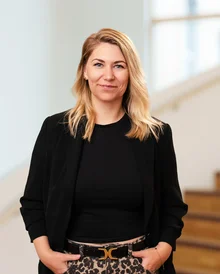On the way to the digital medical practice: first "Digi-Manager:in" training programme launched"
The Westphalia-Lippe Association of Statutory Health Insurance Physicians (KVWL) has launched the first training programme for "Digi-Managers". The Chair of Health Informatics at Witten/Herdecke University is a project partner.

Online appointments or working with telemedicine services such as video consultations are already part of the daily work routine for doctors and psychotherapists. Whether data-supported therapy, e-prescriptions or electronic certificates of incapacity for work (eAU) and patient files (ePA): the small "e" under the heading "eHealth" - "electronic health" - has become indispensable in more and more areas of outpatient medicine.
"Digitalisation is right and important - if it brings added value for both sides, for the doctor and the patient," emphasised Thomas Müller, who is also Head of Digitalisation at the Westphalia-Lippe Association of Statutory Health Insurance Physicians (KVWL), at the training kick-off event at the Ärztehaus in Dortmund. "Sensible digital work is only possible with well-trained staff who can use the various applications correctly and assess the digital processes in the practices," Müller is certain. "To achieve precisely this, we have launched the pilot project and will use it to show what digitalisation can do for practice teams and doctors."
Customised digital working environment
The aim of the practice-based project is to enable future digital managers to analyse the current level of digitalisation in their respective practices, develop their own digitalisation strategy and initiate new digitalisation projects. It is explicitly aimed at non-medical staff in practices. "I'm pleased to say that in addition to 94 women, six men also opted for this training," summarises Müller.
Participants in the training programme invest a total of around 200 hours in the individual, customised further development of their own digital working environment. The practice owners release the future digital managers for this. In March, interested practices were able to apply for one of the initial 100 training places - with over 250 applications, the level of interest significantly exceeded the number of places on offer, so the decision had to be made by drawing lots. "We received a lot of commitment and disappointment about the cancellations. That's why we're planning to offer this innovative project again next year," emphasised Müller in front of the more than 200 prospective digital managers and practice owners who took part on site or online.
Digitising practice processes
The Digi-Manager training programme follows a modular structure that was developed in collaboration with the Academy for Continuing Medical Education of the Westphalia-Lippe Medical Association (ÄKWL) and the KVWL as well as the Chair of Health Informatics at Witten/Herdecke University (UWH). The focus is on the training of multipliers who digitise their own practice processes and become contact persons for the digitisation of patient care. The Federal Ministry of Health (BMG) is funding this highly innovative, experimental pilot project, which is being offered nationwide for the first time, from its innovation fund in order to make healthcare more effective and sustainable.
Digital practice processes
The Digi-Managers first build up up-to-date digitalisation expertise with the help of classroom and online events in the "knowledge module". The practical module then provides them with a practical reference to the content they have learnt. The KVWL's "dipraxis" in Dortmund's Ärztehaus serves as a kind of laboratory for the digitalisation of processes and the selection of digital tools as part of the training - with the aim of working "fully digitally". The core of the practice module is the task of mapping the degree of digitalisation of the respective practice with the help of the KVWL digital maturity model. The Digi-Managers should be able to apply this model to their own practice processes and analyse how digitally the practice operates. The aim here is to recognise opportunities for improvement. In cooperation with the project team, the digital managers develop practice-specific digitalisation strategies that improve practice operations. This is followed by a theoretical examination and a practical evaluation of the developed strategy."
"What is worthwhile for my practice?"
KVWL board member Thomas Müller is proud of the project: "We want to further develop the expertise of the practice staff and relieve the burden on doctors. In this way, we are giving our members the opportunity to recognise digital working as an enrichment and great opportunity for everyday practice work: What adaptations and developments make sense for your practice, what is really worthwhile for my practice?" This is not just about training assistants - it's about training digital managers, says Müller, who are supposed to analyse and make suggestions independently. "In view of the shortage of young talent, we also want to make the job profile of medical assistants more attractive," explains Müller. He predicts: "I'm sure that in a year's time, we will be a big step further in realising the digital possibilities than we are today."
Contact person

Svenja Malessa
Press Officer
Administration | Communication & Marketing
Alfred-Herrhausen-Straße 48
58455 Witten
Room number: 2.F05